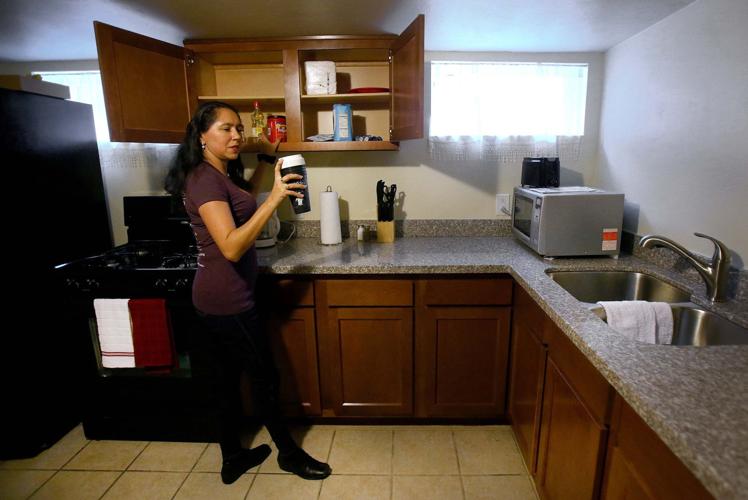Business is booming in the land of sunshine and saguaros for those who rent to tourists through a popular online booking platform.
Tucson property owners collectively took in more than $8 million from Airbnb rentals last year and demand continues to soar in the run-up to the city’s annual gem show.
About 53,000 visitors stayed at local Airbnb properties in 2017, a 73 percent increase from the year prior when about 30,500 did so, said Laura Rillos, a spokeswoman for the San Francisco-based company.
Total rental income for participating Tucson property owners jumped from $5.1 million in 2016 to $8.4 million last year, Rillos said.
The short-term rental trend has been good for the local economy because it serves those who otherwise might not come, said Dan Gibson, a spokesman for Visit Tucson, the city’s tourism bureau.
That’s especially true during peak periods when local hotels tend to sell out, such as during the gem show or homecoming weekend at the University of Arizona, he said.
“In general, having more places for people to stay is a positive. There are people who travel who might not have traveled if they didn’t have the option,” of using Airbnb or similar online entities such as HomeAway, he said.
Hoteliers are less than enthusiastic, concerned that short-term lodging services have morphed into a multimillion-dollar industry with few restrictions.
“While we support new entrants to the sharing economy and the competition it brings, we must be aware and very cautious of the negative impacts and repercussions,” said David Drennon of the Phoenix-based Arizona Lodging & Tourism Association, which lobbies on behalf of trade groups including the Southern Arizona Lodging & Resort Association.
Drennon said his organization has no quarrel with a homeowner who occasionally rents out a guest house or spare room for extra cash. The problem is that there are no limits on how many short-term rentals a single property owner can operate, he said.
In some Arizona cities, Drennon said, “bad actors” are buying and converting entire apartment buildings into Airbnb rentals, effectively creating hotels in residential areas and depleting local supplies of rental housing.
By contrast, traditional hotels typically operate in commercial areas that have much higher property tax rates.
Many cities around the world — from Paris to New York City and even Airbnb’s home city of San Francisco — have laws that limit short-term rentals to protect the hotel industry and residential neighborhoods. But in Arizona, such restrictions aren’t likely any time soon.
Gov. Doug Ducey is a fan of the “sharing economy,” which also includes ride-hailing platforms such Uber and Lyft that are upending the taxi industry. In 2016, Ducey signed a new law that prevents municipalities from restricting short-term tourist rentals and also ensures that renters pay applicable taxes.
Rillos, the Airbnb spokeswoman, said 1,900 Tucson properties are listed on the platform, though not all are actively renting. She said most are private households that host tourists an average of five nights a month for average annual rental income of $5,500 a year.
Celia Webb, who became an Airbnb host in December, said demand has been “nonstop” since she listed the fourplex she bought last summer near North Stone Avenue and West Glenn Street.
“Within three hours I got bookings for the gem show. I was amazed at how well it works,” said Webb, whose rental rates range from $99 to $225 a night.
During peak season, Airbnb hosts tend to raise their rates much like hotels do.
Lupita Johnston, who’s been hosting since 2014, charges $300 a night during the gem show — more than double her usual $120 rate — but her guests don’t mind, she said.
For roughly the cost of two queen beds at a four-star hotel during the gem show, Johnston’s guests get a 2,000-square-foot west-side house filled with art and antiques, with mountain views and sleeping space for nine people.
Visitors come from around the globe, she said, rhyming off a list: “Panama, Holland, Germany, India, Japan, Finland, Denmark and all over the United States.
“They don’t just come for the gem show. They come for funerals and weddings, for conventions, for Cyclovia and El Tour and Dia de los Muertos,” said Johnston, who holds the status of an Airbnb “superhost” — one who has nothing but five-star reviews from customers.
Johnston said she strives to include special touches — local history books on the coffee table, piñatas on the patio, cowboy boots on a shelf — to give visitors “a sense of what Tucson is all about.”
“For the time they are here I try to make them feel like they are part of the community. And they really seem to appreciate it.”





